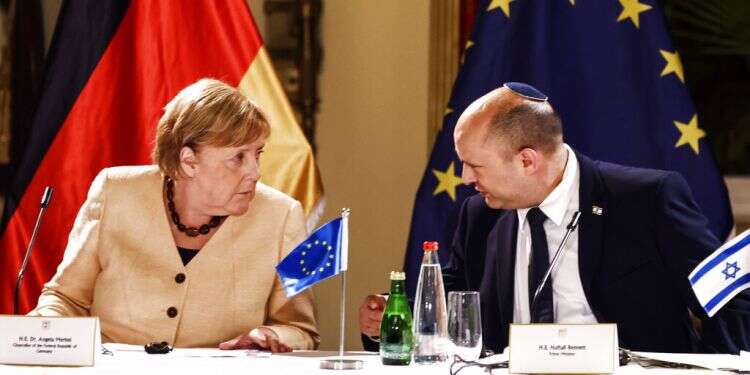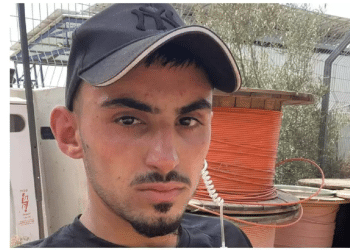German Chancellor Angela Merkel on Monday implored Israel not to "lose sight" of the need to establish a Palestinian state, as she wrapped up a two-day farewell visit.
Follow Israel Hayom on Facebook and Twitter
Merkel's support for a two-state solution has been one of the key disagreements with Israel's leadership during her 16 years in office, which were characterized by unwavering support for Israel.
Speaking at an Israeli think tank, Merkel welcomed the historic diplomatic agreements reached last year between Israel and four Arab countries - led by the United Arab Emirates. But she said the deals, known as the Abraham Accords, did not erase the need for Israel to reach a peace agreement with the Palestinians.
"We must not lose sight of the right of the Palestinians to have a chance to live," she said. "Therefore one should under no circumstances, even as it becomes more and more difficult because of the settlements, lose sight of the issue of a two-state solution," Merkel told a panel at the Institute for National Security Studies in Tel Aviv.
Backers of the Abraham Accords, which were brokered by former US President Donald Trump's administration, have praised them as breaking the long-standing belief that Israel could not forge ties with the Arab world before reaching an agreement with the Palestinians.
Israel's new prime minister, Naftali Bennett, who opposes a Palestinian state on Israeli-occupied lands, has ruled out peace talks with the Palestinians. Instead, he has advocated what he says is a more pragmatic approach to improving living conditions for the Palestinians as a way of lowering tensions. His government, a patchwork of dovish, nationalist, and Arab parties that took office in June, has not announced any major changes in policy thus far.
Merkel welcomed Bennett's intentions but said such an approach would not be enough.
"I think that such a long-running issue (the conflict with the Palestinians) will not disappear from the agenda, even if there are improved relations with neighboring Arab states," she said.
Throughout Merkel's visit, she was welcomed as a "true friend" of Israel. Her agenda included meetings with Israeli leaders and a stop at the Yad Vashem Holocaust memorial and museum.
She repeatedly professed Germany's commitment to Israel's security and said she was confident that her country's next government – to be determined in lengthy coalition talks following an inconclusive election last month – would take a similar stance.
A key issue on the agenda was Iran's nuclear program. Germany was one of the world powers that negotiated the 2015 international nuclear deal with Iran.
Trump unilaterally withdrew from the accord in 2018. The Biden administration has been trying to revive that deal over Israeli objections.
In the meantime, Iran has marched forward with its nuclear activities, such as increased uranium enrichment - a step that can move it closer to building a bomb.
Merkel said that disagreements among the world powers that negotiated the original deal have weakened their position and allowed Iran to buy time and expand its military activities across the region.
"Iran knows this, and therefore we face a very serious situation," she said. She acknowledged that she does not have a solution but called on key players, including Russia and China, to take a stronger public stance against Iran.
"The more countries make it clear that they don't accept the ambitions and aggression of Iran, the better for the region," she said.
Merkel was scheduled to visit in August, but the trip was postponed after the crisis in Afghanistan in which the Taliban seized power. She then delayed the visit until after last month's German election. She now remains in office in a caretaker capacity until a new government is formed, a process that could take weeks or even months.
Subscribe to Israel Hayom's daily newsletter and never miss our top stories!




